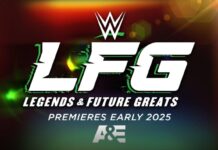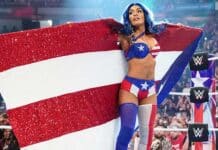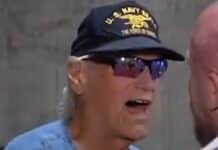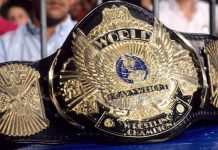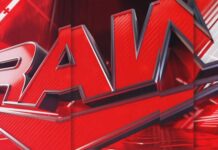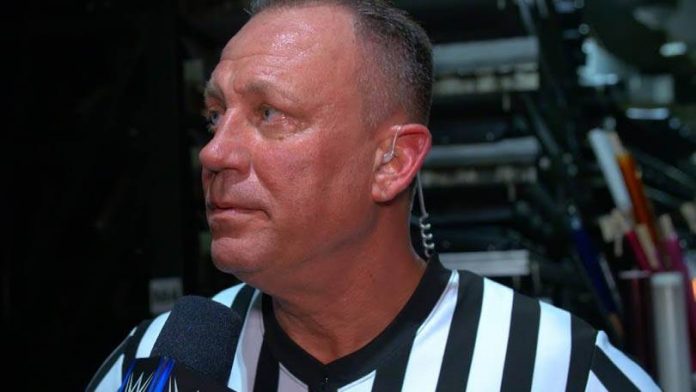
Former WWE referee Mike Chioda exclusively spoke with PWMania.com‘s T.J. Stephens about a wide range of topics including, WWE’s transition throughout the years, the Attitude Era, Brock Lesnar selling like he’d never seen before, the reaction to The Rock vs. Hulk Hogan, Ric Flair, if he considers himself in the Mouth Rushmore of referees and much more.
You can check out the complete interview below:
Did you know you’re the longest-tenured referee in WWE history?
Yeah, I’ve heard that. I’ve heard that. That’s the rumor going around.
I was with WWE for 35 years, and then started refereeing in ’87 and got some help from Chief Jay Strongbow and Gorilla Monsoon, maybe referee Joey Marella helped me out. At that time, Danny Davis, Tim White, a lot of guys just helped me out…we used to do certain territories, and you’d work with Dick Kroll and Dick Woerhley, and all these older, old school timers and all the old-timers. I grew up in the era in the ’80s, you worked with some old-school wrestlers, and you learned a lot, man. So it was great. ’87 I started refereeing, I was doing ring crew when I first started, and I did crew for so many years. In ’89 I made a debut on TV with WWE.
It was late ’80s I believe. Dick was one of the refs for a match, and we noticed that he was wearing wrestling boots. Why was that?
He was just one of a kind. We went through a phase in the WWE for a while. I remember somebody said, one of the agents said, they should wear “referee” boots, and we were like ‘what?.’ So we had to call High Spots to go and try to get these referee boots. You know, black sneakers are fine, and I used to always like to wear three-quarter, high tops, you know, black sneakers, tape your ankles at times to support your ankles if you had a 30 or 40-minute match or so, a pay per view, or on Raw or Smackdown or so forth. So I mean, you know, wrestling boots weren’t really needed but Dick Woerhley he’s the one who pulled it off, that’s for sure.
It definitely caught attention.
It definitely did because he wore the white laces, right? He was a great guy and a good referee back then. He was an old-school guy that’s for sure. He’s a legend in the referees, you know, to me.
How did you get interested in becoming a referee? What does breaking in as a referee in the ’80s look like?
Well, I didn’t I didn’t expect to be a referee. I didn’t have any intentions to referee, I was doing ring crew, and you know I did the ring crew in ’83 for Gorilla Monsoon when he owned a territory for Vince (McMahon) Sr. I used to work for Victor Quiones and he used to run a ring for Gorilla (Monsoon) when Gorilla ran a territory in South Jersey and ran the Philadelphia Spectrum. He also ran Salisbury, Maryland; Wildwood, New Jersey back in the day in the ’80s. I used to work in the summertime for them on ring crew and when I went back to work for a couple years, on weekends in the summer times and made a shitload of money working back then. I mean, you’re talking 1983, I was like, 16 years old or something like that. So I mean, I was making 50 bucks for the road, 50 bucks for the timekeeping, 50 bucks for playing the music, 50 bucks for doing the ring, and I sold programs because Joey Marella didn’t want to sell programs, Tony Chimel didn’t want to sell programs. I was the youngest kid on the block there. So programs were $1 a piece back then, but I used to make 10 cents off the dollar. If I sold 3000 programs, I’d make 500 bucks. I went back into wrestling when my father got sick. When I was about 18, I asked Gorilla for my job back. They gave me my job back, and they got me in the door again. Then it took off from there and then you know, breaking into the business as a referee, and like I said in ’87 Chief Jay one day just turned around and says, ‘I’m tired of these New York State Commission refs,’ and he looked at me, and he goes, ‘Tomorrow afternoon, get a black pair of jeans, a blue shirt, long sleeve shirt, and a bowtie.’ And I’m like, ‘oh what am I now, a waiter?’ Now I can serve drinks at a boys club. Cheif says you’re gonna be a ref. I said, Chief tells me to give him the receipt. The big issue with the New York State Commission refs was some of them wouldn’t show up at all. Some were late and in a lot of cases, they didn’t know the wrestling business. So there was my start right there. My first match was Barry Horowitz and Steve Lombardi. But a lot of the boys and the old timers like George Steele, and a lot of the old school guys, Tony Garea, and everyone helped me out, and Rick Martel. There was a bunch of great, great guys back in the ’80s. You know, Tito Santana, Pedro Morales, a bunch of guys, which was very helpful back in the day.
You mentioned New York State Athletic Commission referees. Some younger viewers/readers may not understand what that means. So before each company had, you know their own roster of referees, which I would say was probably in the mid to late ’80s, this became a very normal thing. How did the Athletic Commissions supply referees? From what I’ve heard they were usually a disaster.
Yeah, they were, they were a disaster, a lot of them. You know, there were only quite a few like commission guys. Like I remember, I think it was like Roger Ruff who I think was out of Ohio. Dick Kroll was always doing Pennsylvania. He was good. Some of these New York State guys, they just had a lot of heat with the agents, and that’s where it turned. I mean, they would supply like, two referees and we would use two referees, they would use two referees, and came down to the point where New York State refs didn’t work. I wound up doing like, five matches. You know, Joey (Marella) did like three, or somebody else would fill in. So it would get to the point that we were using two referees on the show. One crew ref and one full-time ref. So, that’s how that would work.
When the athletic commission would supply referees, a lot of the time from what I’ve read and have come to understand, the referees that they supplied weren’t wrestling referees. So would this affect the matches and the psychology and ring cues and things like that?
No, not really, they were just boxing referees. Now you need a real referee, a ref with a professional referee entertainment license in a lot of states. But back then it was kind of weird. It was just kind of like, they called it boxing / wrestling. So yeah, those referees… even to work the matches in the (Madison Square) Garden, and that was the important part, working Madison Square Garden, Nassau Coliseum, all the way up to upstate New York when we used to run Poughkeepsie. We used to run Binghamton, Syracuse, Rochester all the way up to Buffalo. So it eliminated all those state commission referees all the way up the line there,
How was the wrestling business different in ’89 than say, ’93 or ’94? A follow-up for the Survivor Series ’89, you’re a young kid, and this card is packed with stars, how did that affect you for your debut?
It was fantastic. I mean, Survivor Series… I remember that first one. Stressed like a son of a b****. I mean, I went to Joey Marella, and I’m like, ‘Hey, how do you remember all these matches, like all the finishes on your matches?’ Because I mean, I was stressed. Then you talked to the boys, I’m two years into the business already making my TV debut. I’m on TV now. That was one of the most stressful matches to begin my career. I remember Joey was like, he was like, ‘Don’t worry about it, just try and talk to the boys.’ And he shows me his hand. He’s got all five finishes written down on his hand. This one over this one… This one over this one because we didn’t have IFBs (earpieces). Timekeeper Mark Yeaton, would hold the pencil in his mouth for his cues and give us the one, and the fingers, you would get one for five minutes, two minutes, and so on. Plus, always had codes with his fingers and the ‘go home’ cue, would be the pencil in the mouth. So there was no communication back to Gorilla. It wouldn’t be until way later on to where we got communication back to Gorilla. They could talk in your ear now, and you could talk back to Gorilla. But back then, it was stressful. Joey (Marella) got me through that. I wrote it all down on one hand, and he said, ‘Just make sure it doesn’t sweat and don’t run off.’ So, went over the match in my head and I had that cheat sheet right there that helped me out during my first PPV at Survivor Series.
The talent back then in the ’80s and ’90s going into the Attitude Era, there were so many guys that just had gimmicks. I’m not saying the talent these days don’t protect their gimmick or take their gimmick seriously, their character, or anything like that. But those guys just it was just so many so many different characters and so many different gimmicks, and they played the parts well. There was no schooling, no training, no PC center, no nothing. It was like they grew up and they just had that personality. If you look at all the individuals like Hogan, and Macho Man, and the Dino Bravos, it just goes on down the line. Everybody had a good gimmick, and it was just fun. It was fun to work with the old-school guys back then, it really was.
So you do Survivor Series ’89, and then the next big show I have that you do is WrestleMania VII. There’s a couple of years gap in there in between, obviously, but WrestleMania VII is the is the interesting one. This was the one from Los Angeles that moved from the Coliseum to the Sports Arena. What are your memories of WrestleMania VII, just in general?
I mean, at that time, I was still doing a lot of, you know, ring crew all the time. It was myself and Tony Chimel who had a ring crew out of New Jersey. We were one of the major crews because he was a ring announcer, plus I was a referee too. We both set up the ring. We played music. We did this. We did everything. We were a one-stop shop for a ring crew, and we set up the steel cages, we would take them on the road with us with the ring. I remember that time from the Coliseum to the Sports Arena. It was it was gonna be a smaller setup for us. When you compare it to SummerSlam ’92 when we did Wembley Stadium with over 80,000+. This was with Bret Hart and Bulldog in the main event, and I think Joey Marella did that match. That was an unbelievable stadium to set up. But we thought it was gonna be another stadium setup like that, you know? We went to the Sports Arena, it was nothing really, you know, as far as production, it was a lot easier setup in the Sports Arena.
What do you remember about the level of comfort backstage when Sergeant Slaughter turned heel in the way that he did. This was during the time that Sarge turned Iraqi sympathizer because I’ve heard horror stories about Sgt. Slaughter’s heel run here in 1991, specifically with fans and threats.
Right. You kind of remember those days the company fed off of what was going on, whether it was worldwide or stateside. When you had the Iron Sheik and his Iranian thing, and you had Sgt. Slaughter doing his. It was just, you know, they would feed off what the country was going through sometimes and what was happening around the world. I think it was a great deal where it’s like major heat. That’s what Vince (McMahon) wanted, and he didn’t give a s*** really back then. It might be a little bit more different these days. I doubt they’re gonna be working angles of what’s going on around the world now, but like they did back then. I think it was great heat and a lot of it was successful. I mean, Hogan was the real American, and he told everybody to take your vitamins, do this, and I’m the real American. He’s unbelievable. I just ran into Hogan over in Clearwater a couple of weeks ago. He looks great.
WWF brought in Adnan Al-Kaissie just for this angle, also from the AWA, whos legit Iraqi and was actually childhood friends with Saddam Hussein which added to the realism of the angle and to your point, I don’t know if this works today. Everyone remembers the debacle of Muhammad Hassan.
No, I mean, they did some things back then that I doubt this company would get away with these days. Back then, they used to do certain things, it was just like, ‘Oh my God.’ What we were doing on TV sometimes was just crazy, especially during the Attitude Era. Tits were flying everywhere, and TNA. Triple H or Shawn Michaels or anybody would say ‘Hey lift them shirts up,’ and I’d be in the ring and all of a sudden you’d see like a dozen girls lifting their shirts up and bras off. I’m like, ‘Oh s***.’ Talk about having control of a crowd. That was amazing. And then going into the Attitude Era and going into The Rock and Hogan match, that was phenomenal.
WWF was doing television tapings here, but nothing live. You had All-Star Wrestling and Primetime Wrestling and all those different things, but then you go live with Monday Night Raw in January of ’93. You were the referee for 1-2-3 Kid beating Razor Ramon. From a referee’s perspective, what’s different about going from, say Primetime Wrestling, a taped show scenario, to now being live as a referee?
Those were so unbelievable. When we went and started doing the Manhattan Center, I mean we lived in Jersey so that was one of our closest shots to go to do TV, which was awesome because we’d be on the road 25 days a month anyway. The setup for the Manhattan Center, was the worst setup of all time but what a payday, what a payoff. Working at that theater, with that awesome crowd, it was like your Madison Square Garden crowd but crammed into like 2000 people. I mean that crowd was just energized and just had so much energy. It was a New York City wrestling crowd, and it’s awesome, and working in that was just phenomenal because then it was on live TV. Doing Razor Ramon match with 1-2-3 Kid, and it’s amazing how later on in your career, you look, there are so many matches you did that weren’t even title matches… whether it was Razor Ramon and 1-2-3 Kid, or The Rock and Hogan. They weren’t even title matches, yet they became some of the most popular matches in wrestling. I just loved working with Razor. I’ve got a really cool poster framed from him, and he signed it many years ago. But I remember him telling me that night he wasn’t too happy. He was like, ‘damn, I gotta put this kid over.’ These guys took their s*** serious, you know? Whether it was Shawn (Michaels) telling Bret (Hart), ‘I ain’t doing the job for you.’ Or Bret telling Shawn, ‘I wasn’t doing the job for you.’ I’m going up to Razor saying, ‘You got to put this kid over here.’ He’s like, ‘What?” Well, it’s gonna be something quick,’ you know? And he comes up to me he goes, ‘Chioda, I don’t give f*** what you do, brother, but you better give me the fastest count you got without making it look stupid.’ If you noticed, I sped up that count so fast. But yeah, I mean, the crowd went ballistic in that little Manhattan Center. And, you know, they got the Kid over. People still talk about that match.
What’s interesting too, it’s probably the only time I can remember where somebody lost, and it turned them babyface. Razor was babyface within weeks of that happening. And what I enjoyed about the subsequent Raw shows after that is they kept tinkering with that scenario no matter who it was, and they kept bringing it up to show just how important it was. I remember PJ Walker, who was also PJ Polaco or Justin Credible, he upset Ted DiBiase on Superstars because Razor distracted Ted in the match causing DiBiase to get rolled up.
Yeah, I think the night Kid beat Razor, I think Macho Man was commentating, Bobby Heenan, or Gorilla maybe or something. I mean, what a commentary team right there! I think it was Bobby Heenan, Macho Man, and Vince. That was a fantastic time, it was unbelievable.
So you mentioned the Attitude Era, and that’s where we’re headed next. At what point did you realize that the product was really starting to make a change to be a little rougher around the edges because the WWF didn’t just jump into it? They tiptoed in it for a while, and then they really went all in around 1996 or 1997.
Well, yeah. They tiptoed around for a bit. They had Chyna, you had Triple H, and you had Shawn Michaels and all that, that’s when they kind of made that move, right around, I guess, ’97, I would say with Shawn, you know, ‘Shawn screwed Bret,’ I mean it was basically just a screwjob there. Shawn just took the business to another level, which I think the company, with Vince, had so many top guys. Vince had his right-hand man. Whether it was Pat Patterson or Michael Hayes, and others down the line, they just knew that Shawn Michaels and these guys like Triple H were going to take the business to another level, which they did. And we had so much talent. I mean, we had so much talent, Undertaker, you know, I can sit here and just list so many names, 20 names.
Bret didn’t like the way business was going in ’97. In what we were doing on TV… He didn’t like the way the business was going. I think he was going to do business for Shawn somewhere else. You know, instead of Montreal, maybe get out of Canada and do business in the States. It didn’t work out that way. But then, like I said, Shawn and the guys… there was a rocky road where we were losing them to WCW which really fueled the Monday Night Wars. We were losing to them for a while, you know, and then Big Show showed up. You know, it was a huge thing there. I mean, they were just blowing us out. All of a sudden you lose Hogan and Razor, you lose all of these guys, and they start the nWo. We’re trying to bounce back, and then DX come up with this thing in Virginia. I remember we’re there and they go take off in his tank and stuff. They start the f***ing war (Editors Note: Nitro was at the Norfolk Scope while Raw was in the Hampton Coliseum), which was great. That night was a turning point for our company, and we started making a comeback at that point. Thank God for them (DX). Because we didn’t know if we were going to be working down south for Ted Turner. I’m thinking, ‘Man, how are they going to hire a guy from New Jersey?’ At that time, I was with the WWF for at least 15 years. Thinking, I’m gonna be out of a job at that point. A few years down the road, we buy out WCW, and then Charles (Robinson) and Nick Patrick and the guys came working for us, which was awesome.
You were there at WrestleMania XIV for Austin and Shawn, the crowning of Steve Austin. We’ve all heard the stories, and this is Shawn’s last match for a while, he was not in a good place then by any stretch of the imagination in his personal life. There were questions about whether or not he was going to do business in the ring. Were you told anything specific in your instructions for that match? As far as trying to cover for Shawn or anything like that it was just go out there and do business as normal?
It was business as normal. Everything went smooth. You know, I took that match from Earl (Hebner), Earl was sick at that point, you know, and I had to step up and do that match. So they told me, ‘Look, just do this match, focus on this main event.’ It was just a phenomenal time meeting Mike Tyson. Mike Tyson was a big fan of the WWF. I didn’t know how much he loved wrestling until we met him that night. At rehearsal, we were at the Boston Garden, he comes up, and he’s like, ‘Hey, Mike Chioda.’ And I’m like, ‘What, he knows my name?’ I’m thinking, ‘he knows a referees name?’ I was a huge fan of Mike Tyson. We had a great time, and he went in, he didn’t f*** up the finish. He counted three, that was all that mattered. He knew his spot and when to do it. And, you know, everything was great. I mean Shawn did business as a professional. He had lower back problems at that time and went through a lot of pain and a lot of issues with his lower back. He just went in there and did business like a professional.
Hogan v Rock WrestleMania X8. Hogan comes out it’s quite clear what the crowds gonna be like in Toronto. Have you ever experienced anything like that before?
No, no. I mean, I’ve experienced a lot of different crowd pops. Stone Cold Steve Austin, can’t take nothing away from him and Undertaker and all that, Hulk Hogan, way back in the day. I mean, I’ve never experienced a pop like that, it was 68,000 people in the Skydome. For a big dome to have that, to be that loud, was f***ing amazing. Because domes suck up the music when you play the entrances on big stadiums like that. The crowd noise goes up in the air, but that place was off the charts. It was something I’ve never… I couldn’t even hear myself think, I had goosebumps. It was just phenomenal. I mean, all the way from the start at the entrances, to the shove off, the tackle. Then the “Hulk up” was just like, you’ve gotta be kidding me. Icon vs. Icon, they pulled it off. I mean, there were doubts. There was doubt they were going to really pull off a good match because they didn’t have them go on last. I mean, if we knew it was gonna be that unbelievable, they would have had them go on last, you know?
You also did Cena versus The Rock. Any similarities in the audience between the two and again, and just for clarification, we had never seen anything like Hogan and the Rock.
No, there was no really like similarity in that match. I mean, it was huge. Don’t get me wrong. I believe that was in Miami at Sun Life Stadium. But no, it was nothing like that. I mean, Canada is a different audience. Every wrestler I’ve known that came from Canada, they all can work. They’re all great wrestlers. Whether it’s all the way from Bret Hart to Owen Hart to you know, Benoit, Edge, and Christian. Canadian fans are so loyal to wrestling. When Hogan came out, you knew they didn’t forget about Hulk Hogan, who entertained them for the last 17-18 years. I don’t think he would have got that much of a pop in the red and yellow, but he came out in that NWO gear and that music, and the crowd just went nuts. So I mean, I literally thought like, holy s***, are they going to change the finish? Oh, yeah, it was just it was amazing.
Wrestlemania 31; specifically Roman vs. Brock. The fans aren’t really having it because they think they can see where it’s going. Then Seth Rollins runs in and changes the entire night. When Seth Rollins runs down to cash in, what did you experience there in the ring? Because again, the dynamic was dead for Brock and Roman, and all of a sudden… So what was it like when Rollins ran out to cash in and kind of save the night?
Well, you guys gotta remember the stadium ramps, and I remember when he was running down that ramp. I was like, ‘he’s gotta’ hurry. He’s got a long way to go.’ That’s what we’re always concerned about. You know, and it was a hell of a frickin’ pop. All I remember of that night, I mean as far as Seth cashing in, what a hell of a match that was finishing everything.
Brock sold his ass off, man. I mean, I remember he got gashed open the hard way because he won’t do no other way. He’ll do it the hard way, then anyone will believe it. I’d never seen him f***ing sell like that before. I thought he was actually concussed or he was hurt or dizzy or something like that. I mean, I was sitting there at one point, and I remember I put on the gloves. And next thing you know, I’m looking at him, and I kept asking him, ‘Brock, you alright brother?’ And he’s selling around the ropes and selling around the outside coming back and selling like a son of a gun. I was shocked that he sold so good because I’d never seen him sell like that before. He was always the killer beast monster. And to me, that’s a professional. They were making Roman at that time, and he had to sell to make it believable. That was a hell of a match man, one of the best of my career.
You were there for Ric Flair’s last match. With Andrade El Idolo and Jay Lethal and Jeff Jarrett. I thought the storytelling especially was great. To me, Karen Jarrett needs to get more credit for that because she was outstanding outside the ring. Jeff’s doing some of his best work right now. How do you get picked as the referee and what was that match like to ref?
It was great. I mean, just to be in the ring again, and for Ric Flair in his last match and they just basically had confidence in me doing the match. Conrad Thompson, I do a podcast called “Mailbag” on Ad Free Shows with Paul Bromwell, and I’ve been doing that for about almost three years now. And Conrad texted me, and he said, ‘Hey, I need to know if you’re interested in doing Ric’s last match, he would love to have you officiate his last match.’ I said that it’d be an honor to do Ric’s last match. I was just glad to be in a ring and doing what I do. I was in the locker room and Flair’s doing like 100 squats and I’m thinking, ‘Geez if I did 25 squats I’d be hurt right now.’ But he’s unbelievable man. Ric is just something else, with the energy and the charisma he’s got, I love him.
If you were going to show your career to somebody but you’re going to summarize it in one match, and you’re going to show them this match, but it’s the only match from your career you can show them, what would it be?
Good question. I’ve really never gotten that question before… I mean, there are a ton of matches where I’ve done hour marathons and Shawn Michaels was with the Rougeaus and tagging with The Rockers, I used to love those matches. The Bulldogs. I want to say probably Chris Benoit v Eddie Guerrero on pay-per-view or on SmackDown. I took like three bumps, and I still finished the match. There’s Kurt Angle and Shane. Kurt Angle and Benoit, and Kurt Angle and Brock. I mean, there are so many great matches, it’s hard to really pinpoint just one match in my career.
Do you put yourself on the Mount Rushmore of referees of all time? Because I think you should.
I appreciate that. I hope I could be that fourth one on there. You know, to me, it’s like, you know, I mean, I’m so glad Tim White, WWE, and Vince and Hunter, they put Tim White in the HOF, cause he’s done everything for the company to take care of Andre to doing this to referee and working as an agent. God bless him, I love Timmy White. He was definitely a legend, an icon to me, and a good friend, really good friend, dear friend. Joey (Marella), I would love for them to put in Joey Marella. He’s on my Mount Rushmore because I believe, you know, with the Hogan and Andre match that he had done and so many other matches that he has done in his career before he passed. It was Joey in the beginning. Earl should be up in there too. I hope I get a fourth spot in there, but there’s so many other good referees to in there and everything. You can’t take anything away from Charles Robinson. You can take Tommy Young back then and all that other stuff. Nick Patrick as well. It’s just a lot of refs, you know. I just wish they can make that Mount Rushmore out of six people. Plus, these guys started way before I did. He may not have had the longest career that I had with the company with WWF/ WWE. But I mean, these guys go way back to the 70s into the 80s. I started in ’87, I didn’t make my TV debut until ’89. I always tried to give it my best out there. I was either pinpointed by the wrestlers, the agents, or Vince and they had these productions meetings. If Earl had this match, I’d have another important match. It was great. Travelled around the world and all over the country. Had a great career. As a referee, who’d think you’d have that career and travel around the world. No sport would give you that, not football, not baseball. It’s been a phenomenal career.
This has been a phenomenal interview. It’s such an interesting perspective to me to get it from a referee, the traffic cop in the match as opposed to someone who was in it.
Well, I just put a pattern on third man in the ring, and I’m trying to work on a book and I’m doing some other things.
Hope to see you bounce around somewhere again, in the not too distant future. Don’t go away is what I’m saying.
You got it, man. Not yet. Not yet. I got a few good more years. All right.


